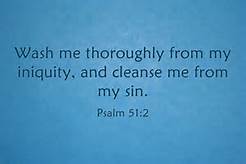“Make Us Clean!”


Psalm 51:1-12 (51:2) – February 17, 2021
The marvel and puzzle of adults with smudges on their foreheads – on purpose! – is a wonder to many children. Why would adults have dirt or ash crosses put on their foreheads? And why wouldn’t they wash it off to make it all clean?
It takes a while for young people to learn, “yes, I am a sinner, too.” Doesn’t it? Sometimes it is difficult for grown-ups to state plainly that they sin, too. They fall short of what God would have for them in this life. They mess up the clean sheet of paper. Isn’t that what sin is? Falling short, missing the mark, washing away the guilt and stains of sin. However we describe it, we know very well when sin happens. King David knew when he was dirty on the inside from sin, too.
It does not matter whether King David was remembering the women of the village where he grew up, washing, scrubbing and wringing out their families’ clothing in tubs outside their homes, or whether we think of the agitator on those automatic wringer washers of yesterday, we all need to be cleansed from the wrongs we commit, on a regular basis.
Today is the first day of Lent, that penitential period of forty days before Easter when the Church all across the world begins to journey with Jesus towards the Cross. Many people use external things like food or drink or certain practices to show their observance of Lent. This is a good thing, and I do not want to cause anyone to rethink their Lenten practices. However, King David here in Psalm 51 had something far more radical in mind. He wanted more than just his exterior cleaned. He wanted his insides cleaned up, too. Cleaned, and renewed!
Ash Wednesday is the day in the liturgical year when we concentrate on renewal—the messing-up we have done, on the inside as well as the outside. Whether large or small, we can all be cleansed and renewed deep down on our insides. The psalmist uses that most intimate of all things, first-person pronouns. “Have mercy upon me,” “blot out my transgressions,” “wash me thoroughly from my iniquity,” “I know my transgressions,” and “my sin is ever before me.”
“We are all first marked with the cross using water (and sometimes oil) at our baptisms. At that time to be marked with the cross is a wonderful thing. We are identified as the beloved children of God. On Ash Wednesday we are marked with the cross using ashes and the words, “remember you are dust.” The ashes and words remind us that we are not so wonderful. In fact, we are all sinners. The sign is not an X, marking us as [mistakes or] hopeless rejects, but a cross reminding us that God loves and forgives us, sinners though we be.” [1]
We are not perfect believers in God. But, God says that is okay. God loves us just the same. This Ash Wednesday service is a special time to gather together, and to become aware of our turning-away from God. This understanding of the messing-up we have done and are continuing to do—prepares us to receive the forgiveness and joy of salvation that comes through Jesus Christ. And the cross of ashes on each forehead is a reminder of that blessed forgiveness in each one of our lives. Praise God, we can be restored to a close relationship with God.
Hear the Good News! In Jesus Christ, we all are forgiven! Amen.
[1] http://worshipingwithchildren.blogspot.com/2015/01/years-abc-ash-wednesday-february-18-2015.html
(Suggestion: visit me at my other blogs: matterofprayer: A Year of Everyday Prayers. #PursuePEACE – and A Year of Being Kind . Thanks!


